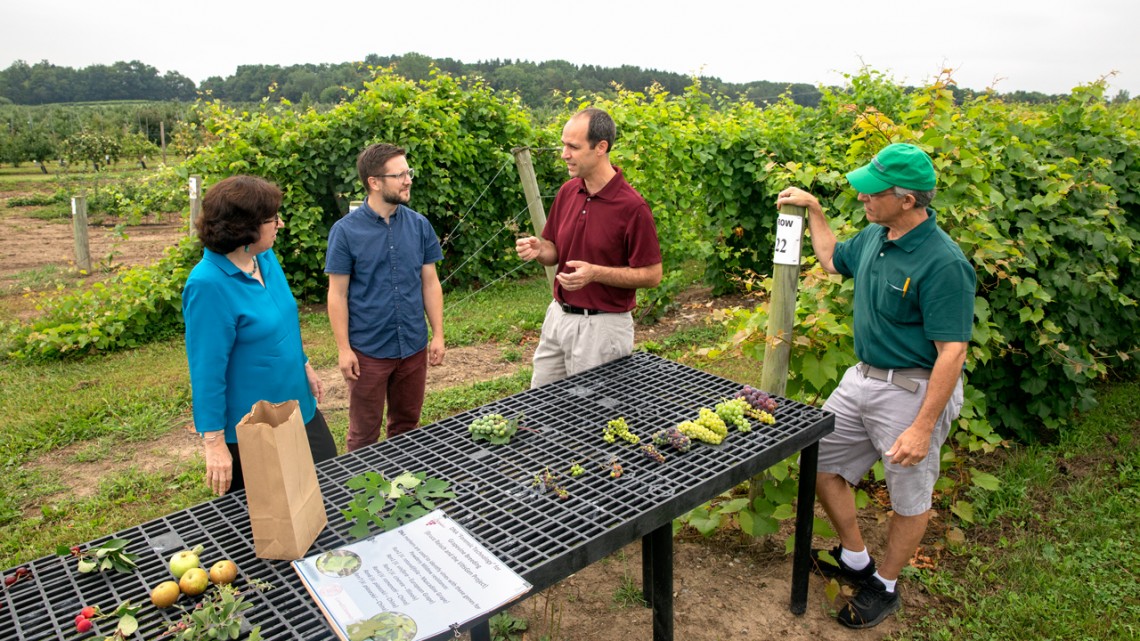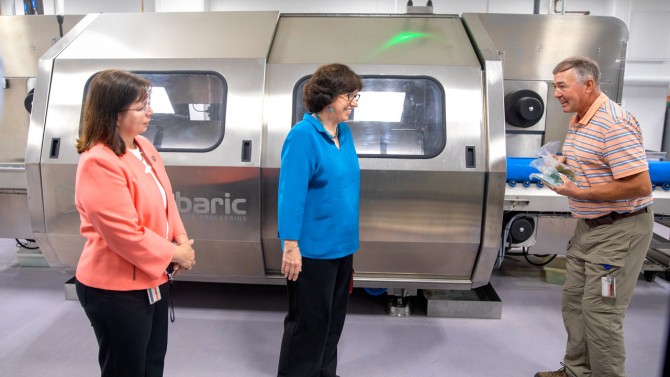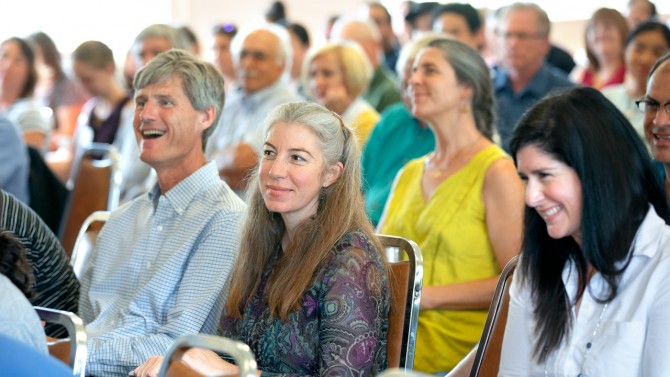
Lance Cadle-Davidson of the U.S. Department of Agriculture’s Agricultural Research Service (USDA-ARS), center, elaborates on Cornell grape research with, left to right, President Martha E. Pollack, geneticist Benjamin Gutierrez of USDA-ARS and Bruce Reisch, professor of grapevine breeding and genetics.
President Pollack touts agricultural innovation at Cornell AgriTech
By Erin Flynn
A tour of the agricultural innovations happening at Cornell AgriTech made Cornell President Martha E. Pollack reconsider for a moment her scientific field.
“This was the type of day that makes you think, ‘Boy, if I were 17, 18 years old, I might have studied something different,’” the computer scientist said to laughter from the crowd. “It probably would have been digital still, but maybe digital agriculture.”
Why she felt that way was clear: “The work that all of you are doing here is so important to human health and to the farm community and, frankly, to the economy of New York state,” Pollack said to faculty, students and staff gathered at Jordan Hall Aug. 13.
Making her first visit to see Cornell’s farms, fields and research facilities in Geneva, New York, Pollack was accompanied by Kathryn J. Boor, the Ronald P. Lynch Dean of the College of Agriculture and Life Sciences (CALS), and senior leaders at the college. Coming on the heels of the Aug. 1 renaming of the New York State Agricultural Experiment Station to Cornell AgriTech, it was an opportunity for Pollack to learn firsthand from faculty, students and staff how they are reimagining the future of agriculture and food science.
Pollack first visited the McCarthy Farm Germplasm Repository, where she met with Bruce Reisch, professor of grapevine breeding and genetics, and Benjamin Gutierrez and Lance Cadle-Davidson of the U.S. Department of Agriculture’s Agricultural Research Service. The repository is home to more than 1,300 cold-hardy grape genotypes and is the largest of its kind on the East Coast.
Owned by the USDA, the repository is an important component of Cornell AgriTech’s grape breeding program, allowing access to genetic traits that can be used to introduce disease resistance and health compounds in grapes. Reisch is leading an effort through the VitisGen2 project to use advanced genomic tools to accelerate the grape-breeding process.
New York, with its $4.8 billion grape and wine industries, relies heavily on Cornell expertise, from breeding new varieties to keeping pests and disease at bay. Pollack visited professor Greg Loeb’s entomology lab to learn about research and solutions for spotted winged drosophila, a pest that causes berry damage. And in professor Marc Fuchs’ plant pathology lab, she discovered how his team is combating the vineyard disease red blotch, which is responsible for millions of dollars in economic losses in New York.
Pollack and Boor met with students pursuing master’s and doctoral degrees in the agricultural sciences to learn about educational opportunities offered to students in Geneva.
“Cornell AgriTech reflects ‘One Cornell’ with its emphasis on interdisciplinary collaboration and innovation,” Boor said. “By applying these strengths to our research, technology and education, our impact on New York’s food and agricultural systems continues to grow.”
The visit included a preview of the renovated pilot plant, a facility devoted to advanced food and beverage research and processing expected to be operational in October, as well as a viewing of the Hiperbaric high-pressure processing unit. Olga Padilla-Zakour, professor of food science and director of the Cornell Food Venture Center, led the tour and highlighted how the new facility and technological advancements will help grow the Food Venture Center’s impact on the New York state food industry.
Pollack finished her tour with a town hall-style meeting with students, staff and faculty. She applauded the spirit of innovation at Cornell AgriTech.
“There is no other place like Cornell AgriTech with such a vital connection to state and global agricultural and food science,” Pollack said. “Your passion is making a difference for growers, entrepreneurs and food processors in New York state and beyond.”
Erin Flynn is senior manager at Cornell AgriTech. Matt Hayes, managing editor and social media officer for the College of Agriculture and Life Sciences, contributed to this report.
Media Contact
Get Cornell news delivered right to your inbox.
Subscribe


